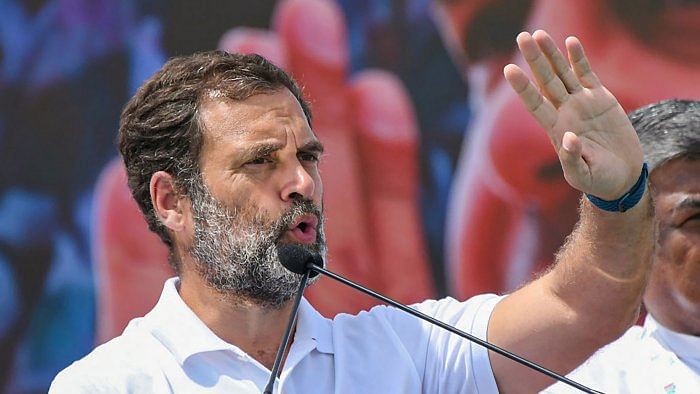
The Gujarat government on Saturday opposed the revision application of Congress leader Rahul Gandhi who has sought a stay on execution of his conviction in the criminal defamation case for calling people with Modi surname as "thieves". The government submitted in the Gujarat high court that it was opposing the application since Gandhi has been convicted in a "serious offence."
On the other hand, Gandhi's advocate Abhishek Manu Singhvi opposed the state government's locus standi and listed cases were convictions had been stayed by courts against legislators who were convicted in serious offences. Singhvi argued state this case is bilateral like a civil dispute and state had nothing to do with it. He argued that the case against Gandhi " is neither serious nor involves moral turpitude and hence, the conviction should be suspended."
Appearing for state government, government prosecutor Mitesh Amin argued that public prosecutor has statutory right of an audience in the court. He said that there are different judgements to this effect but ultimately it would be the discretion of the court.
During the argument, single-judge justice Hemant Prachchhak remarked that Gandhi, as an elected representative, should have been more cautious while making statements. He said, "In fact, it is his more duty towards the people at large. He is representing the people at large... he must make his statements within limits and bounds," he remarked orally.
After a lengthy hearing, justice Prachchhak posted the matter for further hearing on Tuesday. Singhvi argued that Gandhi's statement in Kolar, Karnataka during 2019 election campaign didn't invoked any identifiable class of people and none of the persons figured in the statement including Nirav Modi, Lalit Modi and Vijay Mallya- filed any complaint.
Therefore, he argued that complaint against Gandhi itself was not maintainable as the offence is "in personam" (directed against a particular person or group of persons) and creates a bar on jurisdiction therein. He said that entertaining such a complaint would amount to "mockery of defamation law."
He also said that for offending speech, no evidence in terms of the Evidence Act, or IT Act was produced to justify the conviction. He said that no evidence of alleged statements of Gandhi was produced before the magisterial court.
On March 23, a magisterial court had found Gandhi guilty in the criminal defamation case. He was sentenced to two years of imprisonment, the maximum jail term under sections 499 and 500 of Indian Penal Code. The case against Gandhi was filed by Surat BJP MLA and former minister Purnesh Modi.
Singhvi said that lower court relied upon a case against Navjot Singh Sindhu. He said that Sidhu was convicted for murder but his conviction was also suspended unlike Gandhi's. He mentioned how within 24 hours of passing of the judgement, Gandhi was disqualified as a member of parliament (MP). And, last week, he had to vacate his official bungalow in Delhi he was occupying as an MP representing Wayanad constituency.
On April 20, Gandhi had moved before a sessions court in Surat where also his plea was rejected.